weight loss:
lose weight while protecting your heart – 2
In helping you lose weight successfully it is well documented that there are certain foods to avoid. Not only will they hinder your weight loss efforts but will increase the risk of strokes and heart attacks.
efforts but will increase the risk of strokes and heart attacks.
They will also lead to weight increase and eventually obesity, which, in turn, leads to other serious or life-threatening diseases associated with obesity, such as type-2 diabetes and some forms of cancer.
The main foods to avoid are those that contain high amounts of trans-fats, such as most fast foods: burgers, cheeseburgers, fried chicken portions and French fries, are just a few. Not only will these foods increase bad cholesterol but are loaded with calories, not good for weight loss!
soups

Although there are many soups that are healthy and nutritious, all creamed soups are high in fat content. The commercially prepared ones are particularly fat-heavy, and since the fat cannot be readily removed from them, they are food to avoid.
meats

Apart from liver, all offal such as sweetbreads, brains, kidneys, caviar, fish roe, and giblets are high in cholesterol and fat content, so treat them as foods avoid. Liver, As mentioned in the previous page, is an exception as it is a valuable nutritional source of essential vitamins and minerals and counteracts the action of fat and cholesterol.
Pork and pork products, bacon, and ham are also high in fat and cholesterol and also foods to avoid and should not be eaten, except as an occasional meal.
fish

While there a many species of fish that are nutritious and healthy there are certain types such as bass, bluefish, butterfish, deviled crab, eel, herring, mackerel, scalloped or fried oysters, pompano, salmon, sardines, shad, and trout are high in fat content and is better if you avoid them, or at least, eat them only occasionally, although generally, they are still lower in fat content than most meats.
poultry

Avoid both duck and goose as they are very high in fat and cholesterol content. If you must use them prepare them in the fat-free way described under the section of Meats Permitted in Foods To Embrace.
dairy products
Whole milk, cream, butter (although there are differing opinions about butter), and unless labeled low fat, cheeses such as American cheddar, Swiss, cream, creamed cottage, cheese spreads, Gruyere, Edam, Limberger, Liederkranz, Parmesan, Roquefort, and yogurt made from whole milk are all high in fats and should not be included in your diet.
eggs

Although they constitute only around one third of an egg, the yolk is one of the foods highest in cholesterol and fat content you can eat. If you must eat eggs, eat them only occasionally, and poached or scrambled is preferred to fried as frying will only increase the fat content.
breads
If you are interested in home baking there are many recipes for bread and pastries that can be found in low-or fat-free cook and recipe books. Otherwise avoid the commercially produced ones as they all contain an appreciable amount of lard, butter, or egg yolk. Hot breads, pancakes, waffles, coffee cakes, muffins, buns, doughnuts, Danish pastry, sweet rolls.
desserts

All desserts made with lard, suet, butter, egg-yolks, or cream, such as pies, cakes, pastries, cookies, custards, eclairs, gingerbread, shortcake, and puddings, should be avoided. Exceptionally high in fat and cholesterol are ice-cream, parfaits, and frozen creams.
miscellaneous foods

Avocados, coconuts, nuts, chocolate (although dark chocolate in moderation is nutritious and full of antioxidants), cocoa, fat contained in standard salad dressings, gravies, and sauces are all very fatty. Avoid using animal fats, including lard and suet, in cooking.
foods to avoid: recommended cooking methods
Grilling is preferable to frying. Frying should be completely eliminated in the preparation of foods, not only because of its high fat production, but also because of its unhealthy way of interfering with the normal digestion of foods and essential nutriments and vitamins.
Frying food not only causes an irritating character and adverse effect on the digestive tract of the fried fats, but also destroys most of vitamins and essential foodstuffs in the food that is fried.
Even some vegetable fats are high in saturated fats and are best not used. An exception can be made for vegetable oils such as soya oil, corn seed oil, and cottonseed oils.
When cooking vegetables, steaming is better than boiling in an open pan. Steaming retains more of the vitamins and minerals normally lost in boiling. Also, the water produced from steaming contains vitamins and minerals and can be used in making fat-free gravies.
If cooking meat, particularly beef or lamb, cook in a slow cooker rather than roast in the oven. Again, this retains more of the vitamins and minerals lost when roasting. Once the meat is cooked the essence, which contains minerals and vitamins lost in roasting, can be used, along with the vegetable water in making virtually fat-free gravy.
Pour the essence into a suitable clean receptacle and once cooled, place in the fridge where the fat will rise to the top and solidify. Remove the layer of fat and, as stated above, the essence can then be used as a stock or in virtually fat-free gravies.
Alcohol has no fat content, so there are no restrictions on its use other than by the dictates of common sense and self-control. Don’t forget that the calories in liquors can easily mount up!
I hope this has given you some insight into the foods to avoid that will aid weight loss, a healthy heart, and help maintain a healthy lifestyle.
The menus on the following pages are for information only. Although they have been devised by nutritionists and health experts and have been used quite successfully for many years to help reduce the risk of strokes and heart attacks and also to promote weight loss, the publisher accepts no liability for any claims arising from their use of.


